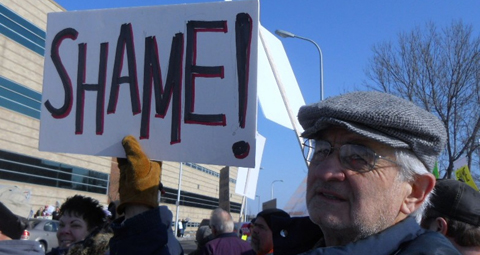March 2 | ![]() 0 COMMENTS
0 COMMENTS ![]() print
print

There is nothing less Catholic than guilt
An overused cliche is nonsense, THE BOW IN THE HEAVENS says, but shame has its value - By FR JOHN BOLLAN
I awoke this morning to find a photo in my inbox from a Roman friend, showing the Vatican dusted in snow. I then forwarded the picture to the Bear Grylls of the Bow, Jim Lynch, to say the Pope had been on the phone and had a wee job for him—and could he bring his salt spreader?!
Such is Jim’s all-too evident love for clearing and gritting the carpark in inclement conditions, that the prospect of taking on St Peter’s Square might well have made him pass out with excitement.
After a few balmy days last week, a chill wind is whistling at the windows of St Joseph’s. ‘Spring is postponed,’ as one headline put it. But the spring-time of Lent (and, remember that is what ‘Lent’ actually means) rolls on now towards its third week.
On Monday evening we had First Confession for the primary school. As in most parishes now, the children receive the Sacrament for the first time in full view of their families. They come up on to the sanctuary, one by one, to confess their sins and receive absolution.
This is all very different from the days when I made my First Confession as a pupil in St Gabriel’s Primary. I mention the school as it was, to all intents and purposes, a curricular activity. After careful preparation, one afternoon we were marched along the road to the Church and sent into the confessionals and, well, that was it. We were marched back to school and had something interesting to tell our parents when they asked what we had done that day.
Given my precociousness, I probably told them that I had been ‘shriven’ by Fr O’Keefe. I seem to remember getting a miraculous medal out of it, so I was well pleased.
The kids were down in the Church for a practice the other day and, as the confessional is still the usual setting for the Sacrament, I always show them around. Some are genuinely disappointed that it isn’t a box at all (at times like this, one wonders what images are conjured up in their heads by religious terminology).
They had some interesting questions too: “Does the screen go back?”
“How close is your face to the wee curtain?”
“Is that a kettle?”
To which the answers are ‘No it doesn’t,’ ‘About a foot,’ and ‘No, it’s a dehumidifier.’
I remember last year’s tour made such an impression on one of the children that, while I popped into ‘the box’ to hear some of the grown-ups at the end of the First Confessions, she decided to make her Second Confession in there as well.
Given her impish nature, her teachers thought there was a strong possibility that she did already have something new to confess, even in that short interval.
I know that some people feel a little uncomfortable with the notion of Confession, and more particularly with the idea of having young children exposed to it. I’d like to think that we have a slightly more sophisticated and sympathetic approach to this than we once did.
Going back to my own experience—and the bizarre images which can get stuck in our heads —I recall being told that our souls were like little ghostly vests which got stained by our sins. Grace, on the other hand, was like washing powder and got those pesky stains out!
This concerned me somewhat, as I had quite sensitive skin and my mum always had to get special soap powder for me. Would grace give me a rash?
I think many of the problems we have as adults when it comes to the Sacrament of Reconciliation may lie in our first exposure to it. It’s very easy to become stuck in a childish understanding of what the Sacrament is for and, as result, feel that you’ve outgrown it because it no longer ‘speaks to your situation.’
A problem which many adult Catholics struggle with is that cliche which often gets trotted out on phone-in programmes and chat shows: “Catholic guilt.”
You know the sort of thing, a lapsed ‘celeb’ trumpets the fact they went to a convent school and then bangs on about feeling ‘Catholic guilt’ about going to a garden centre rather than church on a Sunday.
Nothing could be less Catholic than ‘guilt’; that existential dead-end which has absolutely nothing to offer us. Freud is the guru of guilt, not Jesus.
What Catholics do have, or should have, is a well-defined sense of shame. Shame is that awareness of the extent to which we fall short of our full stature, or our conduct fails to match what we know to be right or worthy of us. It’s that idea of worth which is crucial, I think.
Guilt, being essentially a negative thing, is based upon how bad we are. Shame, on the other hand, derives its force from the realisation of how good we should be, as well as the ways in which we act, speak and think in a manner which is inconsistent with that goodness.
Guilt is an invitation to self-loathing, whereas shame is a call to self-improvement (in the spiritual, non-faddish sense of the term). Guilt hands you the stick to beat yourself with, whereas shame wants you to use it to stand up again.
Whenever we encounter the ministry of reconciliation in the Gospel, it is almost always bound up with Jesus’ ministry as a healer. That is the paradigm in which the Church still prefers us to encounter this Sacrament.
Oddly enough, the last deep conversation I had about such matters was with a doctor, my friend Stephen. He’s not a Catholic, so his observations have a left-field quality which force me to ‘think outside the (confessional) box’ as I try to respond to them.
As an oncologist, he spends a lot of his time scrutinising scans for any minute metastases, spots which indicate the spread of a cancer from another part of the body. He’s big on detail, that’s for sure.
Like the Primary 4 kids, he’s also full of questions: ‘Is there a spiritual immune system and how does it get compromised?’
‘Do you think sin spreads?’
‘How does a blessing work?’ His questions aren’t quite as easily handled as those of the children, but I try my best.
It might be a clumsy analogy, but, just as the illness Stephen spends his time battling can be a matter of heredity and the environment, so we can attribute sin to the ‘selfish gene’ of Original Sin and the consequences of our own choices. An examination of conscience shouldn’t be a cursory checklist, but something more akin to a scan, which shows up the unseen connections between our sins.
This can, a bit like metastasis, indicate how a shadow on the soul can spread.
A resentment from the past can manifest in the present; a habit of harsh judgement can take hold and skew the way we see others and their lives; worst of all, we can take flight from our own reality and seek refuge in an insubstantial mirage, much as Satan tried to do to Jesus during his ‘Lent.’
Anyway, let us leave the confessional for now. I have to make some important executive decisions about the sacristy carpet. I’m reliably informed that it’s same one which was first laid in 1953 when the Church was opened. Generations of Bow Farmers and Bow Shepherds have walked upon it. If carpets could talk, I wonder what tales this one could tell? What it seems to be saying most clearly, however, is ‘replace me!’
Our fabric (and fashion) committee have embarked upon a modest campaign of freshening up the place and it’s their view that a new carpet is somewhat overdue.
While I’m prepared to splash out on that, I think I’ll disregard the anonymous suggestion that we commission a portrait of our acolyte Matthew in time for his 50th birthday. Let’s just say the handwriting is a bit of a give-away. Now, as for a kettle for my confessional… I think we could stretch to that no bother.










